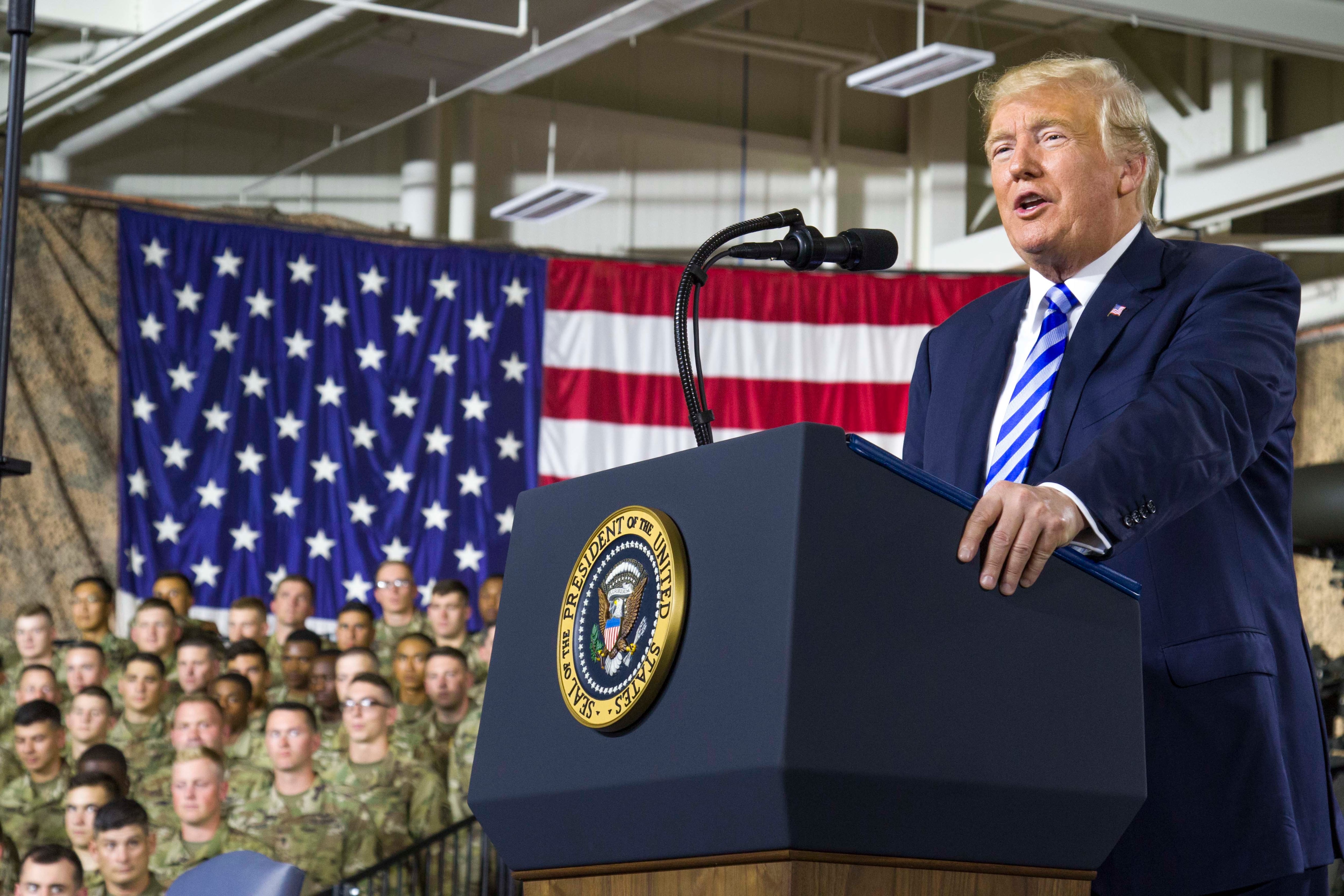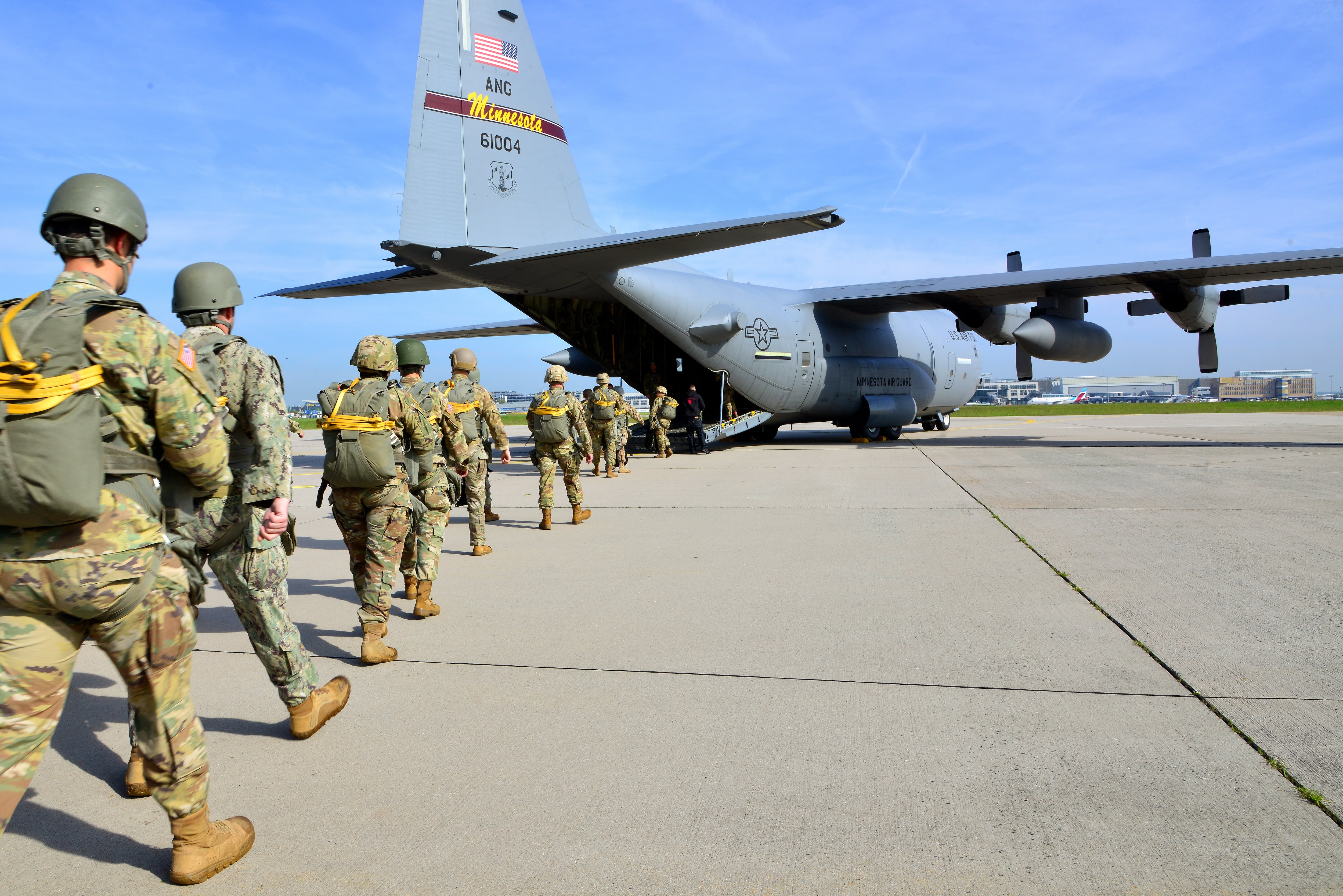Congressional leaders on Thursday released their final draft of the sweeping defense authorization bill for fiscal 2021 with provisions for a 3 percent pay raise for troops next year, language to force the renaming of Army bases honoring Confederate leaders, and new provisions to improve medical care and safety related to the ongoing coronavirus pandemic.
The $740.5 billion defense policy bill is expected to easily pass both the House and Senate in coming days but could face a White House veto after President Donald Trump vowed to halt the bill over the Confederate bases requirement and the lack of any provisions rolling back legal protections for social media companies.
The base name fight has been lingering for months, while the social media issue was introduced by Trump in just the last few days, following months of negotiations over the voluminous military policy legislation.
RELATED

It has passed Congress for 59 consecutive years, an imposing streak in an increasingly politically fractured legislature. Both Republican and Democratic leaders in recent days have chastised Trump for the veto threats, calling them an attack on force readiness and military members.
The bill “sends a clear signal to our troops that we support them, their families, and their mission: that we have their back,” said House Armed Services Committee ranking member Mac Thornberry, R-Texas.
“It also sends an unmistakable message to our adversaries: America is united behind a military that is engaged with the world, that supports our allies, and will resolutely defend our interests and freedoms. Those are messages we cannot send often enough.”
Pay priorities
The 3 percent pay raise outlined in the bill matches the expected pay boost prescribed under federal statute. Even if the measure is vetoed, the pay raise will still go into effect next year.
It’s the first time in a decade that troops have seen consecutive years with salary boosts of at least 3 percent. This past January, military pay increased by 3.1 percent.
For junior enlisted troops, the raise would amount to roughly $860 more a year in pay. For senior enlisted and junior officers, the hike equals about $1,500 more. An O-4 with 12 years service would see more than $2,800 extra next year under the increase.
Also under the bill, service members who qualify for hazardous duty pay would see maximum payouts increase from $250 a month to $275 a month. The increase would not apply to troops serving in hostile fire areas and combat zones, who are already eligible for up to $450 a month in extra pay.
The measure also includes reauthorizations of dozens of other specialty pay and bonus which would be halted if the measure doesn’t become law by the end of December.
RELATED

Personnel moves
The Navy would see an end strength of almost 7,000 sailors under the plan, while the Army would see a boost of almost 6,000 soldiers.
The Air Force would increase by about 700 airmen, while the Marine Corps would be the only service to see a decrease in personnel (down about 5,000 from current force levels).
Lawmakers also included language limiting any reduction in U.S. forces stationed in Germany below 34,500 for at least four months, until after the Defense Department submits an assessment of the possible changes. Trump in recent months has pushed for significant reductions there, to reposition American military forces elsewhere in Europe.
It also prohibits reducing the number of troops deployed to South Korea below 28,500 “unless numerous certifications and requirements are met.”
And the bill requires defense officials to submit a risk assessment to Congress on Afghanistan once troop levels drop below 4,000 or current levels there and again when they drop below 2,000.
Acting Defense Secretary Chris Miller announced on Nov. 17 that forces in that country would draw down from 4,500 to 2,500 by Jan. 15, continuing on a Trump administration plan laid out earlier this year that would bring the number to zero by May.
Congressional officials said the Afghanistan language was not specifically in response to Trump’s vows to withdraw all troops from Afghanistan in coming months, but instead basic oversight of the 19-year-old military mission there.
RELATED

Pandemic response
Under the final draft of the legislation, defense officials would be required to maintain a 30-day supply of personal protective equipment “sufficient for every active and reserve service member” for the foreseeable future.
It also includes extra protections for reservists and Guard members, tens of thousands of whom have deployed across the country in recent months to assist state pandemic response efforts.
Troops whose drill weekends were postponed or cancelled due to coronavirus restrictions would not be penalized for the lost time in their retirement eligibility. Individuals mobilized for pandemic response missions would be guaranteed at least 14 days of quarantine housing following those activations.
The legislation also creates a registry of Tricare beneficiaries diagnosed with coronavirus for potential future medical tracking, and calls for additional resources for department medical laboratories “to facilitate rapid research and development of vaccines, diagnostics, and therapeutics in case of future pandemic.”
RELATED

Family assistance
Child care is a major focus of the bill, following lawmakers’ vows earlier in the year to put more emphasis on military family and military children needs.
The legislation requires defense officials to provide child care to any service member or defense civilian employee who works on rotating shifts at a military installation. Families with two or more children at military day care facilities would also be guaranteed discounts in their current bills.
Lawmakers also are requiring defense officials to better track and respond to incidents of child abuse involving dependents of service members, after complaints from advocates about a lack of sufficient oversight to the problem in the ranks.
Building on military housing reforms included in last year’s defense authorization bill, the legislation requires better response from private-sector landlords to tenant complaints and requires assistance for families who have been displaced because of privatized military housing issues.
For military spouses seeking jobs, the bill includes improvements to the Military Spouse Employment Partnership Program and allows military officials to reimburse any costs incurred to maintain professional licenses and credentials amid military family moves.
RELATED

Base naming fight
The most controversial aspect of the bill is the Confederate names issue. Lawmakers will require the Defense Department to establish a commission “to study and provide recommendations, within three years, concerning the removal of names, symbols, displays, monuments, and paraphernalia” related to the Confederacy.
Members from both parties and chambers supported the language in initial drafts of the bill, but several Republicans have decried the renaming move since Trump’s veto threats.
Advocates for the changes have called it a matter of respect for minority troops forced to serve on bases honoring individuals who supported slavery and racism. Trump has called it an attempt at political correctness that erases an important part of American military history: the names of bases that have been used for several decades.
Lawmakers expect to pass the measure in both chambers next week and send it to Trump for his final signature, even with some defections over Trump’s objections.
If Trump follows through with his veto threat, lawmakers will likely only have a few days before the end of the current session — Jan. 3 — to hold a veto override vote, and will have to recall members from their holiday break to Capitol Hill for the action.
Failing that, lawmakers could try and introduce a new version of the legislation in the next session of Congress in early January to ensure that some critical pay and policy provisions are reauthorized. But officials said they have not started any such work, hoping instead to avoid the presidential veto.
Leo covers Congress, Veterans Affairs and the White House for Military Times. He has covered Washington, D.C. since 2004, focusing on military personnel and veterans policies. His work has earned numerous honors, including a 2009 Polk award, a 2010 National Headliner Award, the IAVA Leadership in Journalism award and the VFW News Media award.




